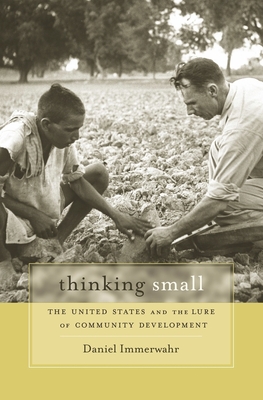

 Harvard University Press
Harvard University Press
Thinking Small: The United States and the Lure of Community Development


Key Metrics
- Daniel Immerwahr
- Harvard University Press
- Hardcover
- 9780674289949
- 9.7 X 6.3 X 0.9 inches
- 1.1 pounds
- History > United States - 20th Century
- English
 Secure Transaction
Secure TransactionBook Description
Thinking Small tells the story of how the United States sought to rescue the world from poverty through small-scale, community-based approaches. And it also sounds a warning: such strategies, now again in vogue, have been tried before, with often disastrous consequences.
It is common for historians to interpret the United States' postwar development campaigns as ill-advised attempts to impose modernity upon poorer nations. The small-scale projects that are popular today mark a retreat from that top-down, heavy-handed approach. But Daniel Immerwahr shows that community-based development is nothing new: it has been present since the origins of international development practice, existing alongside--and sometimes at the heart of--grander schemes to modernize the global South. His transnational study follows a set of strange bedfellows--the Peace Corps and the CIA, Mohandas Gandhi and Ferdinand Marcos, antipoverty activists and Cold Warriors--united by their conviction that development should not be about engineers building dams but about communities shaping their own fates. The programs they designed covered hundreds of millions of people in some sixty countries, eventually making their way back to the United States itself during the War on Poverty.
Yet the hope that small communities might lift themselves up was often disappointed, as self-help gave way to crushing forms of local oppression. Thinking Small challenges those who hope to eradicate poverty to think twice about the risks as well as the benefits of community development.
Author Bio
Daniel Immerwahr (Ph.D., Berkeley, 2011) is a professor of history, specializing in twentieth-century U.S. history within a global context. His first book, Thinking Small (Harvard, 2015), offers a critical account of grassroots development campaigns launched by the United States at home and abroad. It won the Merle Curti Award in Intellectual History from the Organization of American Historians and the Society for U.S. Intellectual History's annual book award.
His second book, How to Hide an Empire (Farrar, Straus and Giroux, 2019), tells the history of the United States with its overseas territory included in the story. That book was a national bestseller, a New York Times critic's choice for one of the best books of 2019, and the winner of the Robert H. Ferrell Prize from the Society for Historians of American Foreign Relations. Immerwahr's writings have appeared in the New York Times, The Guardian, the Washington Post, The New Republic, The Nation, Dissent, Jacobin, and Slate, among other places.
Source: Department of History of Northwestern University
Videos








Community reviews
Write a ReviewNo Community reviews